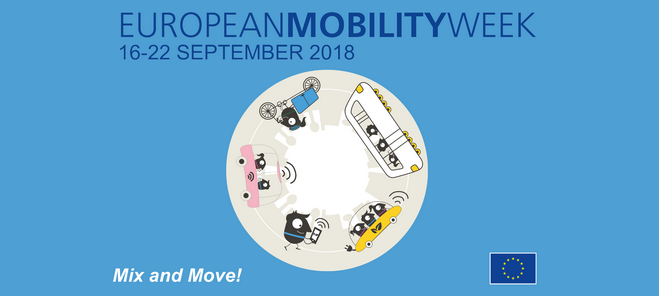
This Sunday the European Commission launches for the 17th time EUROPEANMOBILITYWEEK, its flagship campaign that runs from 16 – 22 September annually with the aim to improve quality of life by promoting clean mobility and sustainable urban transport. Over 2,400 towns and cities from 50 countries will hold events to mark this year’s celebration, giving people the opportunity to explore the role of mobility in their daily lives and to experiment with clean transport modes. MOBILITY WEEK culminates in the trademark car-free day.
EU Transport Commissioner Violeta Bulc has declared 2018 the ‘Year of Multimodality’, which has defined the theme of this year’s EUROPEANMOBILITYWEEK: “Mix and Move!”. It encourages people to see how their daily travel needs can be met more efficiently, more cost-effectively, and more enjoyably by mixing transport modes.
Commissioner Bulc said: “With this year's edition of the EUROPEANMOBILITYWEEK, we want to encourage everyone to consider different mobility options and select the most appropriate ones for each trip. By mixing the ways we move, we can save time, improve our health, and lower our transport costs. This week is also an opportunity for cities to accelerate this social shift by making sure the right services and infrastructure are in place.”
Karmenu Vella, EU Commissioner for Environment, Maritime Affairs and Fisheries, said: “Mixing and moving means supporting a transition to a more human transport system. It means promoting cleaner, more fuel-efficient modes, and more human-powered travel. It’s a great way of keeping the focus at the local level and helping European towns and cities to improve the environmental performance of their transport system. It means cleaner air, quieter cities, and healthier citizens – what’s not to like?”
Local authorities that make significant efforts to promote sustainable urban mobility during the campaign can apply for the EUROPEANMOBILITYWEEK Awards until 23 October 2018. Local authorities can also apply by 1 October 2018 for the SUMP Award, which recognises local and regional authorities for excellence in sustainable urban mobility planning.
On 19 September the 2018 EUROPEANMOBILITYWEEK will also include the third edition of the European day without a road death, which aims at raising awareness on road safety.
Background information
EUROPEANMOBILITYWEEK focuses on a different aspect of sustainable urban mobility each year. Local governments across Europe stimulate multimodality by improving transport connections and making clean and active mobility modes more attractive. In Esch sur Alzette (Luxembourg), the local authorities have installed signposts for pedestrians that indicate distances in walking time, enabling people to assess their preferences for driving, taking public transport or simply walking for a few minutes. Budapest (Hungary) and Vienna (Austria) rank amongst the cities that have embraced the concept of Mobility as a Service (MaaS), which is defined as the “integration of various forms of transport services into a single mobility service accessible on demand”. The Centre for Budapest Transport (BKK) has launched the FUTÁR Journey Planner which provides door-to-door itineraries. This app provides information on all public transport under BKK’s authority, including the metro, tram, bus, trolleybus, urban train and ferry, as well as on best options for the last mile of the journey, whether by foot, bicycle or shared bike. Vienna’s MaaS platform ‘WienMobil’ provides real-time information about door-to-door journeys and routing, and enables users to buy tickets directly from the app. When it comes to moving goods, the concept of consolidation is at the core of multimodal freight solutions. Madrid (Spain) recently refurbished a municipal market located at the gateway to the city and turned it into an Urban Consolidation Centre. From here, several private operators deliver goods using fully-electric vans. The concept of an ‘eco package hub’, which consists of a container placed in a central location from which staff deliver packages on foot or by electric vehicle, was tested by the delivery company UPS in Hamburg (Germany) and is now in place in various European cities including Basel (Switzerland) and Dublin (Ireland). As a result, each city has benefited from lower freight emissions and reduced the number of heavy vehicles in the city centre.
For more information
To learn more about how the European Commission supports towns and cities and promotes sustainable urban mobility, take a look at "Europe on the Move", the Commission's agenda for safe, clean and connected mobility, the urban mobility package, and the additional information on Commission support:
https://ec.europa.eu/transport/modes/road/news/2018-05-17-europe-on-the…
https://ec.europa.eu/transport/themes/logistics-and-multimodal-transpor…
https://ec.europa.eu/transport/themes/urban/urban_mobility/ump_en
https://ec.europa.eu/transport/themes/urban/urban_mobility/commission-s…
For the latest updates use #mobilityweek, follow us on Twitter and like us on Facebook and Instagram!
Details
- Publication date
- 14 September 2018
- Author
- Directorate-General for Mobility and Transport
